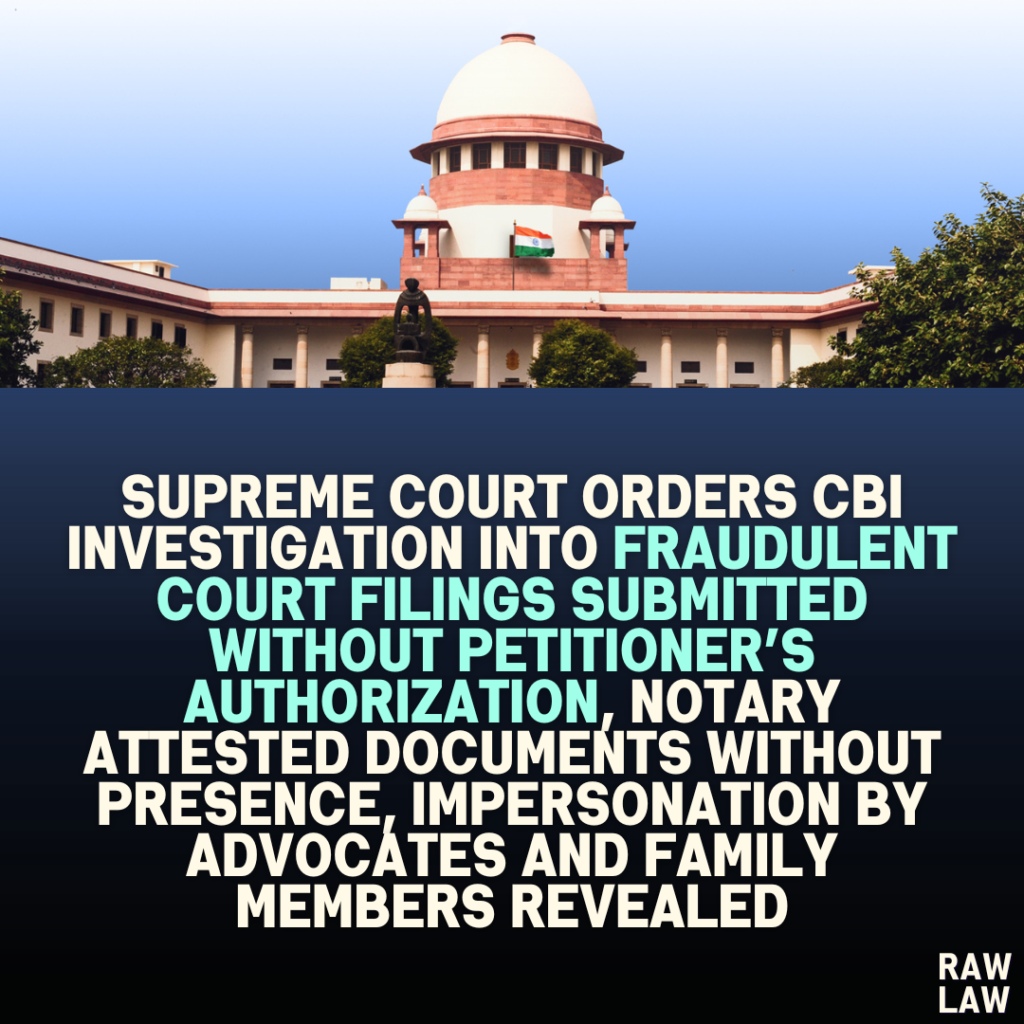Court’s Decision:
The Supreme Court has directed the Central Bureau of Investigation (CBI) to investigate the fraudulent filing of petitions in the name of Bhagwan Singh, which were allegedly submitted without his knowledge. The Court found that multiple advocates and a notary were involved in forging and submitting false documents. The Court stated that the fraudulent acts attempted to manipulate the judicial system, affecting not only the courts but also justice itself. It ordered the CBI to complete a thorough investigation and submit its report within two months. The petitions were dismissed, and all related records were ordered to be handed over to the CBI.
Facts of the Case:
The appeals before the Supreme Court arose from false filings of Special Leave Petitions (SLP) in the name of Bhagwan Singh. The case began when Bhagwan Singh learned that a petition had been filed in his name without his authorization or knowledge. Upon investigation, it was revealed that his daughter, Rinki, and her husband, Sukhpal Singh, with the assistance of a group of advocates, had filed fraudulent petitions in both the High Court and the Supreme Court, impersonating Bhagwan Singh. The petition was related to charges against Ajay Katara, a key witness in the Nitish Katara murder case, who was allegedly being targeted with false criminal cases.
Issues:
- Whether the petitions filed in the name of Bhagwan Singh were fraudulent and involved misuse of the judicial process.
- Whether the advocates and the notary involved had violated their professional duties by facilitating the filing of false documents.
Petitioner’s Arguments:
Bhagwan Singh, the alleged petitioner, claimed he had no knowledge of the petitions filed in his name and that he had not met his daughter or her husband since 2013. He further stated that he had never signed any legal documents, including the vakalatnama (authorization for legal representation), related to the proceedings.
Respondent’s Arguments:
Ajay Katara, the respondent, contended that he was being targeted with false cases in retaliation for his testimony in the Nitish Katara murder trial. He alleged that multiple frivolous cases, including the present one, were filed against him by the associates of Vikas Yadav, the convicted son of a former MP, D.P. Yadav.
Analysis of the Law:
The Court referred to provisions under the Indian Penal Code (IPC) and the Bhartiya Nyaya Sanhita, 2023, which criminalize the filing of false and fraudulent documents in legal proceedings. It highlighted the responsibility of advocates and notaries to ensure the authenticity of documents submitted to the courts and to act in accordance with their professional duties.
Precedent Analysis:
The Court relied on previous rulings, such as V. Chandrasekaran & Anr. vs. Administrative Officer & Ors., which emphasized that the judicial process must not be allowed to become an instrument of fraud or abuse. The Court reiterated that the legal system must ensure transparency and honesty in all proceedings.
Court’s Reasoning:
The Supreme Court found that there was clear evidence of misconduct by the advocates involved in filing the false petitions. The notary had attested documents without the presence of Bhagwan Singh, and the advocates had knowingly submitted forged documents. The Court emphasized that the legal profession carries a high ethical responsibility, and violations of this trust undermine the entire judicial system.
Conclusion:
The Supreme Court ordered a CBI investigation into the fraudulent court proceedings and directed the agency to submit a report within two months. The Court also called for corrective measures within the legal profession to prevent such abuses in the future. The petitions were dismissed, and the Court highlighted the need for strict adherence to professional standards by advocates and notaries.
Implications:
This ruling underscores the judiciary’s commitment to maintaining the integrity of the legal system and holding legal professionals accountable for their actions. It sends a clear message that attempts to manipulate the judicial process through fraudulent means will not be tolerated, and those involved will face serious consequences, including criminal investigations.




Pingback: Jammu & Kashmir High Court Dismisses Petition Against Superannuation Order, Citing Tampering in Service Records and Rejecting Claim of Entitlement to Work Until 2018 Based on Altered Date of Birth - Raw Law